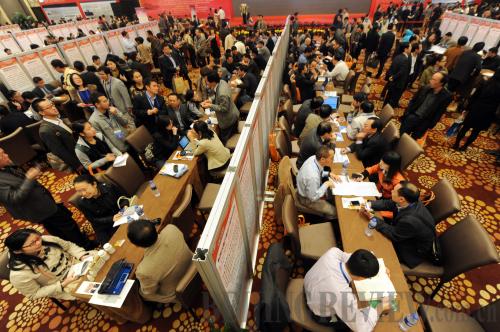|
 |
|
PARTNERING UP: More than 440 Chinese scientists and engineers working overseas look for local research and business partners at a special event in Hangzhou, Zhejiang Province, on November 7, 2012 (HONG ZONGZHI) |
Zhou Ran, who received a doctor's degree in microelectronics from the University of Texas at Dallas, the United States, is an analog integrated circuit design engineer at Shenzhen State Microelectronics Co. Ltd. in south China's Guangdong Province. He decided to come back to China earlier this year to change the stereotype that China can only make cheap and shoddy products. He also found it difficult for Chinese people to establish a sense of belonging or be accepted by mainstream society in the United States.
Like Zhou, more and more Chinese students are coming back to their home country after studying abroad to advance their careers, with most of them faring well.
Between 1978 and 2012, more than 2.6 million Chinese citizens studied outside the country, making China the biggest source of international students, according to the Ministry of Education. During the same period, around 1.09 million Chinese overseas students chose to return to China after finishing their studies.
Despite the deficit, an unprecedented number of Chinese students are returning home in search of job opportunities. In 2012 alone, 272,900 Chinese returned, up 46.57 percent compared to 2011. The year-on-year growth in returning students has been above 20 percent since 2008.
Coming home
According to a recent report on the career development of overseas returnees, most have no difficulty finding jobs in an increasingly competitive job market. The report, issued together by the Beijing-based Center for China and Globalization and China Social Sciences Academic Press, said that 86.3 percent of those returning to China were employed within six months of their return while only 5.5 percent spent more than a year searching for a job.
Wang Huiyao, Director of the Center for China and Globalization and chief author of the report, explained that returning students have a diploma from a foreign institution and an excellent command of a foreign language, which makes them the perfect employees for companies keen to expand their overseas operations and contacts.
The report said that most returnees studied finance, economics, management and engineering, which are all in demand across China's labor market.
According to Wang, today's overseas students have different factors to consider when deciding when to launch their career compared with older generations.
Wang's report revealed the results of a survey among recent overseas returnees. It found that 90.9 percent of respondents regarded being closer to their parents a factor that brought them back home, while 78.4 percent were confident of their career prospects in China. Joining multinational companies' Chinese branches is the number one choice for returning students as more than a quarter of them landed their first job at one after returning. The report explained that overseas returnees' experience with another culture made them ideal workers in companies aiming for a higher degree of globalization.
"Many Chinese overseas students stayed abroad after graduating in the 1980s and 1990s due to the considerable gap between China and where they studied in terms of standards of living, which is understandable," Wang said. He added that the new generation of returnees
who were born in the 1980s and 1990s are mostly the only children of middle-class parents. They went abroad to obtain a degree from a foreign institution, but with no intention to emigrate.
Wang said that while China's fast economic growth attracts many returnees, fewer job opportunities in recession-bound Europe or the United States and harsher policies on immigrants by foreign governments also contribute to the surge of returnees in recent years.
Incentives
While the number of students flowing both in and out of China has been peaking in the past five years, China is still hungry for more brilliant scientists and engineers as well as people with solid management expertise to fuel its modernization.
| 